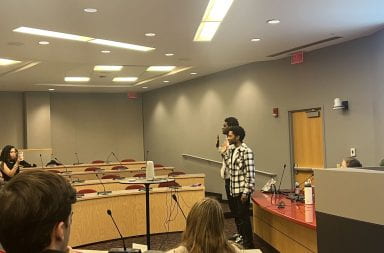Americans owe about $1 trillion in student loans, and some universities are taking a forceful course of action to get payment.
According to multiple sources, schools such as Yale University, University of Pennsylvania and George Washington University have sued their graduates for failure to pay loans.
Some of the students targeted are recipients of federal Perkins loans, which are low-interest student loans for those with financial need.
About 500,000 Perkins loans are awarded annually, according to “Time Magazine.”
Perkins loans differ from other federal loans because the loan is administered by the university and paid for with federal funds, rather than other federal student loans that are only funded by the Department of Education.
“It’s the institution’s responsibility to collect Perkins loans,” said Virginia Layton, Ohio State’s director of financial services.
Layton said OSU awarded more than 2,000 Perkins loans in the last academic year, which totaled $5.7 million in Perkins loans.
For OSU graduates that default on a loan payment, what happens is not entirely up to the university.
If a Perkins loan is more than 12 months delinquent on a payment, Layton said the Office of Financial Services is required to send the case to the Ohio Attorney General’s office to decide how to best collect that payment.
From there, some cases are sent to a “special counsel,” and the Ohio Attorney General office can take legal action if needed.
Layton said only a “small number” of graduates have been sent to the “special counsel.” Layton did not know if or how many OSU graduates have been sent to court, however in a Monday interview with The Lantern OSU President E. Gordon Gee said less than 1 percent of OSU students default on their loans.
OSU students must participate in an entrance interview before they are given a Perkins loan and an exit interview after they graduate in an effort to ensure students understand the responsibility of the loan.
“We do our best to educate students about their Perkins loan repayment responsibilities while there are here,” Layton said. “We work with them to help them remember it is their responsibility to make the Perkins loan payment(s) on time.”
Kate Riegel, a fourth-year in marketing, is set to graduate this May with subsidized, unsubsidized and Perkins loans. She did not disclose the amount of loans she will graduate with but said it will take her about 10 years to finish paying.
“I think (sueing is) a very drastic measure,” Riegel said. “I think from their point of view, if they’re not getting their money, they have to do something about it, but I feel like there are better steps than suing.”
Erin Gerber graduated in June 2012 with a degree in biology and now works for the nonprofit Christian organization Young Life.
Gerber, who graduated with $28,000 of subsidized and unsubsidized student loans, said it will take her about 10 years to pay off. She said she thinks graduates should be penalized for not paying loans on time, but suing is not the answer.
“Suing them is not going to help the situation, because that will put them in even more debt which means they will struggle even more to pay back their loans,” she said.


